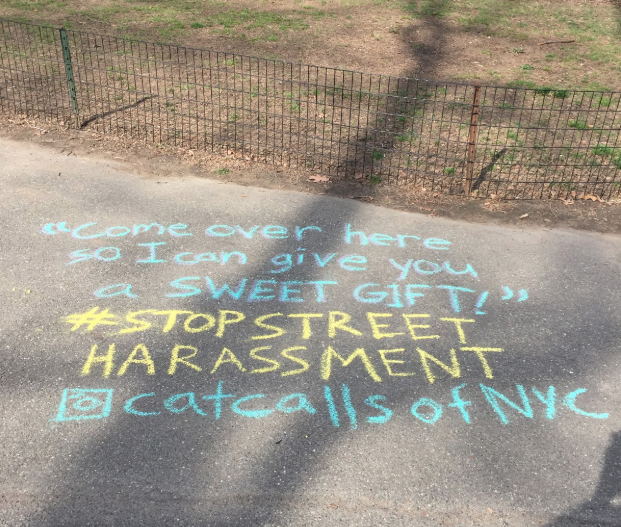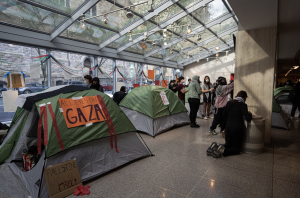College Girls Against Catcalls
AYSESU YILMAZ/THE OBSERVER
One of many examples of catcalls sent in to Catcalls of NYC. Every submission is chalked on a sidewalk in the city to raise awareness.
May 1, 2019
Trigger warning: This article mentions sexual assault.
Ever since the #MeToo movement gained worldwide attention, the once-taboo topic of sexual harassment has been displayed in a new light. Women who are familiar with the experience of harassment on the street are also familiar with its many defenses:
“Take a compliment!”
“You’re overreacting!”
“There’s nothing wrong with flirting!” and the most victim-blaming one,
“You should dress differently if you don’t want attention.”
Now, women everywhere are taking back the streets and calling out catcalling, and at its forefront are none other than college girls in our very own New York City.
Sophie Sandberg, a senior at NYU, experienced sexual street harassment many times and decided enough was enough. She founded Catcalls of NYC, a social project that raises awareness of street harassment. Through social media accounts, people, almost all women, from New York City send in dozens of stories every single day to Catcalls of NYC describing their experiences with catcalling. A team of “chalkers” then take the catcalls sent in by these women and chalk them on the street where it took place. The entire team is made of college girls, including yours truly. If you see any chalkings around Columbus Circle, Lincoln Center or Central Park, chances are they’re by me. The project has reached as far as Miami and London.
But what exactly is catcalling? It’s a nickname given to a specific type of harassment where random strangers on the street shout sexually explicit comments towards other strangers. These comments also sometimes include unwanted physical contact like groping, slapping and grabbing. The nature of catcalls can range from embarrassing and objectifying — “Wow you’re pretty, let’s do it in your dorm!” — to terrifying and threatening — “It’ll be so good, you won’t want to call it rape.” These are two real catcalls sent to Catcalls of NYC.
Although catcalling can be experienced by anyone, regardless of gender, it is important to remember that this is a gender equality epidemic almost always aimed towards women with the goal of degrading or humiliating them. When a random man shouts at me on the street, “Hey baby, you’re sexy!” I don’t actually feel “sexy.” Rather, I feel scared — what does this man want to do to me? Is he going to follow me? Is he going to hurt me?
And oftentimes, that is the case. There are many instances of women being assaulted and even murdered by men who sexually harass them because the women reject their sexual advances.
Catcalling can take many forms of offense. Some of the most common targets for catcalls are underage girls, who receive comments like “Call me when you’re legal, doll!” (another real catcall sent by a 13-year-old). Underage girls are often targeted because they are easily frightened, much to the enjoyment of sexual harassers. Racial slurs are common in catcalls, as well. A recent chalking we did in Central Park by Pilgrim Hill was, “Hey look, a pretty little squaw! Be my little Pocahontas!” aimed towards a young Native American girl.
To learn more about the Catcalls of NYC project, visit www.catcallsofnyc.com.













